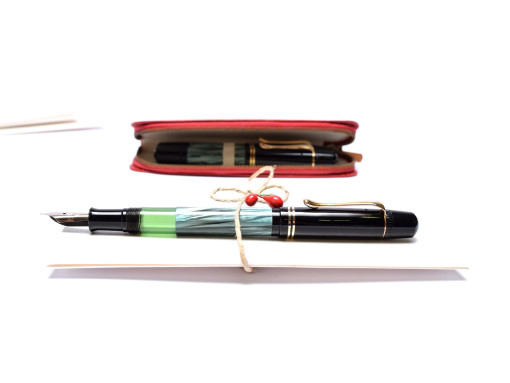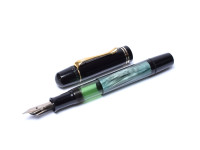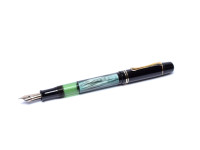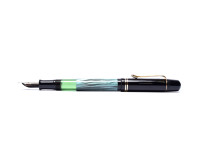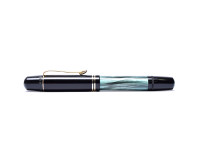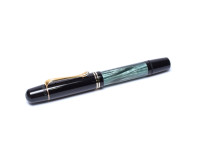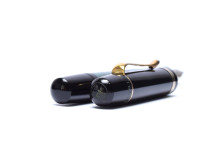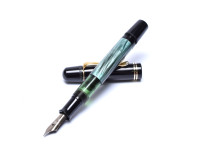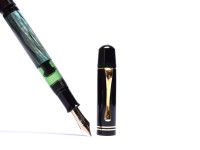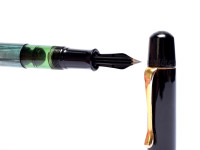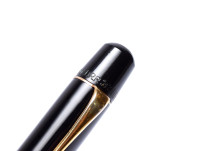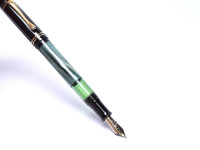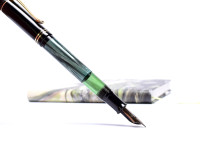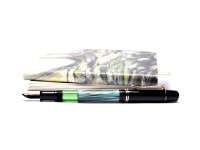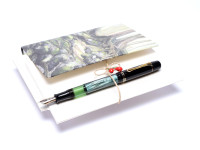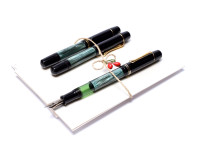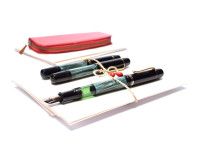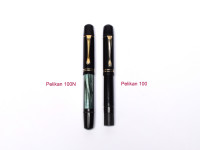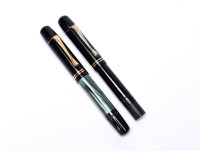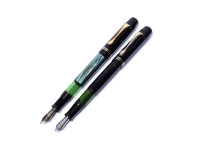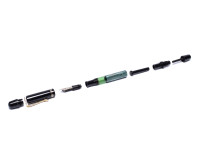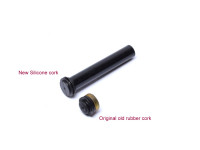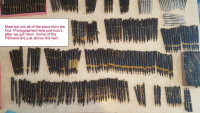Details
Pelikan 100N Green Marbled
Manufacturer/Model: Pelikan Germany/100N Green Marbled
Year of production: Exact year unknown, somewhere between 1942 and 1944
Filling system: Piston filling (New Silicone Cork Installed as replacement for the original "rubber" cork)
Nib: CN - Chromium Nickel - Traces of gold plating on the nib - F Fine Super Flex melts on paper, writes up to BB/3B, super wet and consistent; Original Ebonite feed with 3 vertical fins in Ebonite collar
Material: Celluloid & Ebonite. Gold Plated clip and rings, standard drop shape clip
Length (pen closed): 121.5mm, 161.5mm posed; Diameter at cap 13.2mm; Diameter at barrel ink window 11.2mm; Diameter at barrel sleeve 12mm; Cap length with captop and clip 61mm; Barrel length without nib with t.knob 99mm
Condition and information:
*Date first published & listed: July 30th 2021
You can see a video and writing sample of this pen here:
https://www.youtube.com/watch?v=BshGadnCdpo
Context & Provenance:
To read more about the circumstances about how and where this pen was found, please visit our blog page here:
https://www.protopens.com/blog
The Green Marbled Pelikan 100N:
The pen offered in this listing and pictured above, is one out of 33 Pelikan 100 and 100N pens in this Attic find. Out of these 33 Pelikans there are only 4 Pelikan 100N Green Marbled pens in never used condition. Unlike some of the other Pelikans in this find, that had shown some corrosion on the clips which is easily serviceable/restorable, these 4 Green Marbled Pelikans were basically brand new, no corrosion or any kind of blemishing whatsoever. This is due to how they were kept, as even the moisture in the air can cause corrosion over many decades. Usually in such conditions if the pens touch each other can cause these effects, it also depends in what kind of box they were stored, were there any additional wrappings such as paper or a cloth, as those together with the box will absorb most of the air moisture and more sudden temperature variances and act as a buffer in a way. On the other hand some air moisture is also good for the pens, so the same pens kept in the same location can exhibit differences in aging when the time axis becomes so long. All of these 4 pens have identical CN nibs, and each will be featured individually unless identical to this one, which will be also clearly stated in each consecutive listing. The inscription on the cap is "Pelikan D.R.P.".
Probably the most revealing factor for determining the year of production of these pens including the one on offer here is the piston head, that the the rubber like material that replaced the old wooden cork. These were introduced in 1942. The second most revealing feature is that the pens offered here have a separate part as the section, which is made out of celluloid, therefore these are not the one part section-body barrels that were introduced after 1944, where the entire section and barrel are one single part. Another easy way to determine if the body is injection molded or traditionally made on a lathe is that on the latter there is a small notch on the barrel right at the intersection of the sleeve and ink window, this feature is not present on the injection molded pens. The CN nib would suggest the pen was made after 1939, and the green color barrel would indicate a year of production after 1940, while the rubber cork would suggest year of production after 1942, therefore the most likely time window of production is 1942-43-44.
The 100N is larger in size than the 100, it is basically a completely different pen and not a single part between 100 and 100N is interchangeable. Please see the couple of photos for comparison. Still the pens are almost the same length when posted, and both are perfect form factors, and to this day unmatched by any other pens. All of the parts on this pen are its original one as it was found, and the only part that is changed on these pens is the original rubber cork. These corks tend to shrink overtime and do not make for a perfect fit within the inside of the barrel. Even though we have a technique to restore these corks and widen them a bit in order to fit and create vacuum, they may shrik again in the future and leak the ink behind the piston head which is obviously not a solution. This is why we opted on using a newly manufactured low profile two ring seals black silicone corks which make for a perfect fit and perfect suction. Due to their lower profile the piston head has a longer movement and thus can suck up more ink. With these corks the pistons now work flawlessly and smooth on these pens as the day they were made and will last for at least several decades.
The pen offered here as most pens from this collection is a museum worthy Pelikan 100N Green Marbled fountain pen. The Pelikan 100 was the first piston fountain pen with a differential piston filling system, invented by the Hungarian engineer Theodor Kovacs in 1925, after which he sold the patent to Pelikan
and made the Pelikan 100 possible, after a failed wide market adoption first tried with the manufacturer Penkala from Zagreb, Croatia. The differential piston system we know and still use today, is based on this one, the rest is history. Both the 100 and the 100N were produced in parallel for 1-2 years after 1937 when the 100N was introduced. First the 100N was only produced for export, and was often exported together with the 100, while in Germany only the 100 was offered for 1-2 more years. The Pelikan 100N is the successor of the 100.
Early Pelikan celluloid pens are virtually unmatched by any pen manufacturer in any era, they are simply breathtakingly beautiful objects with such a deep patina, shine, gloss and most unique patterns for the color celluloids, they are simply works of art. The Pelikan 100 embodies the Bauhaus design where form follows function, and to this day, it is still one of the most comfortable pens to hold and use, simply fits in the hand, has a perfect balance and thickness, has a natural warmth and feel in the hand, it simply belongs.
Pelikan, starting in 1929 marketed these pens as the first transparent pens, where the ink level can be easily read and easily refilled with the piston action when the ink was going low. In addition they proudly marketed the pen as astonishing technical advance in writing, which couldn't be more true as we still use the same filling and writing principles today. Another nice feature is the 4 thread spiral on the cap and on the barrel; no matter where the starting position is when the user starts to screws or unscrews the cap, the cap will be screwed/unscrewed all the way to close or open the pen on in only 1-1.25 rotations. These are just some of the details that make these vintage Pelikan pens so special.
Most amazingly however is the pen's condition. The pen has no cracks, scratches, dings, chips or teeth marks, no deformations, discoloring, it is simply a time capsule as it was made months and not 80 years ago. The pen is in perfect working order. Made with about 18 parts, this is a masterpiece of precision engineering, hard to believe that it was made 80 years ago. There is that amazing barrel clarity rarely seen on these old 100s, a lovely bright green ink window. The inscription on the captop is nice and crisp, inscribed twice in a row, "Pelikan D.R.P." which stands for Deutsches Republic Patent. The rings are tightly fit to the cap that suggests there is no shrinkage or deformations.
One of the best things about this pen is of course its nib. This is the epiphany of nib making. The nib is fully flexible, F size CN nib which stands for Chromium-Nickel, with large breathing hole. The CN nibs were the successors of the Pd nibs which came after the prohibition of gold for non essential use during WWII. The idea was that since this alloy didn't rust and was also flexible, it would provide the same feeling and writing experience as the gold nib. In most respects they were right, and it did, superbly. This is a truly super flexible nib that simply melts on the paper. It will write any size from F up to double broad or even wider. The F nib is much smoother on the paper, and will only become more smooth as it adapts to its owner writing angles and style. It is fed by its original ebonite feed with 3 vertical fins/radiators and large ink canal to feed this wet nib. The 100N nibs and feeds are one size larger than the 100 feeds and nibs, and this is obvious when the pens are seen side by side. This feed has a very large ink canal allowing for constant ink flow, making the nib quite wet.
It's not by chance that the 100/100N are one of the most appreciated, most collected and most admired pens in the world. Having the pleasure of working with so many of these pens, one understands why this is. It's just amazing the precision with which these pens were crafted, the ebonite/hard rubber differential piston mechanism is so well engineered, the entire pen disassembles like a true mechanical machinery, no glue was used in the original assembly, no lubricants were used, all parts are threaded or friction fitted. The form, shape and size were spot on from the day it was conceived, and they still are to this day, it just felt so right in the hand, the weight and the ergonomics, basically perfect.
These Pelikan 100Ns are more than just pens, they are engineering and design timeless masterpieces.
*Please feel free to contact us if you need any additional information or if you'd like to add or comment on this description.
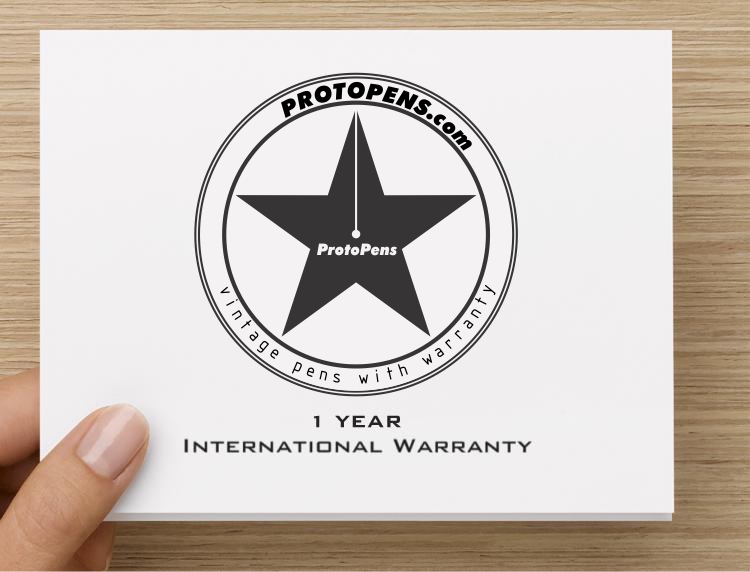
This item is covered by our 1 Year Full International Warranty at no additional cost. The terms of our Warranty are very simple, meant to give you a secure and trouble-free buying experience.
-

Original Genuine Montblanc No.10019 (Art No 16120) Twist Action Fountain Pen Piston Converter in Box
Regular Price: $22.99
Special Price $15.95
-
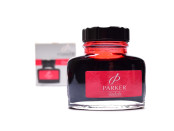
NOS Vintage Rare 1999 PARKER QUINK RED Rouge Fountain Pen Glass Bottled Ink 57ml 1.9fl oz Made in France
$27.99 -
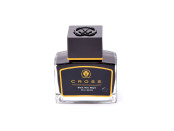
NOS Special CROSS Black Noir Negro Archival ISO Standard Bottled 2 fl. oz. | 62.5ml Fountain / Dip Pen Ink in Glass Bottle
$26.99 -

Rare Vintage 1990s PELIKAN 4001 Ink Glass Bottle Container White Cap Made in Turkey Königsblau / Royal Blue
$6.49 - More Ink & Refills ...
-
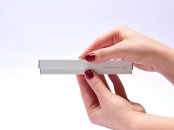
Pack of 5 ProtoPens Vintage Style Safe Keeping Storage Shipping and Organizing Fountain Ballpoint Pencil Pen Case Box
$8.99 -
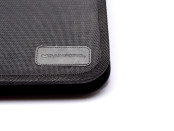
Rare Sanford 36 Slots High Quality Black Hardcover Zipper Pouch Case Holder/Folder Made in U.S.A by COLOMBIA TWO INC Portland Oregon
Regular Price: $199.99
Special Price $58.99
- More Cases ...
This item is located in Europe and ships Worldwide.
At checkout you can choose between two shipping options:
$12.95 Regular Postal Service, Priority & Registered Airmail - Limited Tracking 1-4 WEEKS Delivery
$54.95 DHL Express International - Accurate Tracking 1-4 DAYS Delivery Worldwide
Learn more about these shipping options.
Prior shipping our items have to pass our highest quality control inspection, are perfectly cleaned and tested by ProtoPens pen staff after which are carefully packed. If the pen does not come in its original manufacturers box, it is packed in a special ProtoPens case.
RETURS: Returns are accepted. You are welcome to ship the item back to us within 7 days after receiving it in the same condition it was delivered to you and we will issue you a full refund! Learn more...
(NOTE: If you don’t receive an email from us soon, please check your email spam folder)


